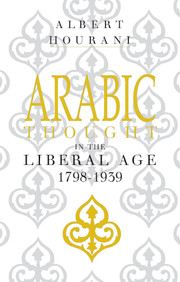Book contents
- Frontmatter
- Contents
- Preface to the 1983 reissue
- Note on Transliteration and References
- I THE ISLAMIC STATE
- II THE OTTOMAN EMPIRE
- III FIRST VIEWS OF EUROPE
- IV THE FIRST GENERATION: TAHTAWI, KHAYR AL-DIN, AND BUSTANI
- V JAMAL AL-DIN AL-AFGHANI
- VI MUHAMMAD ‘ABDUH
- VII ‘ABDUH'S EGYPTIAN DISCIPLES: ISLAM AND MODERN CIVILIZATION
- VIII EGYPTIAN NATIONALISM
- IX RASHID RIDA
- X CHRISTIAN SECULARISTS: SHUMAYYIL AND ANTUN
- XI ARAB NATIONALISM
- XII TAHA HUSAYN
- XIII EPILOGUE: PAST AND FUTURE
- Select Bibliography
- Index
XIII - EPILOGUE: PAST AND FUTURE
Published online by Cambridge University Press: 05 June 2012
- Frontmatter
- Contents
- Preface to the 1983 reissue
- Note on Transliteration and References
- I THE ISLAMIC STATE
- II THE OTTOMAN EMPIRE
- III FIRST VIEWS OF EUROPE
- IV THE FIRST GENERATION: TAHTAWI, KHAYR AL-DIN, AND BUSTANI
- V JAMAL AL-DIN AL-AFGHANI
- VI MUHAMMAD ‘ABDUH
- VII ‘ABDUH'S EGYPTIAN DISCIPLES: ISLAM AND MODERN CIVILIZATION
- VIII EGYPTIAN NATIONALISM
- IX RASHID RIDA
- X CHRISTIAN SECULARISTS: SHUMAYYIL AND ANTUN
- XI ARAB NATIONALISM
- XII TAHA HUSAYN
- XIII EPILOGUE: PAST AND FUTURE
- Select Bibliography
- Index
Summary
An age passed away in 1939, and with it there went a certain type of political thought. In its most obvious expression, this thought was ‘nationalist’, whether Arab or Egyptian, Turkish or Persian, Kurdish or Jewish or Armenian: that is to say, it asserted that there existed between members of a certain group a link so strong and important that they should form a political community, and that a government possessed moral authority only if it expressed the will of that community and served its interests. There can be many different types of community, and in the Middle East of the period with which this book has dealt there were three main types of nationalism, each overlapping with the others but derived from a different principle. First in order of time there was ‘religious’ nationalism: the assertion that all who adhered to the same religion should form a single political community. In one sense this had been the fundamental political idea of the region since the Roman Empire became Christian and religious faith, whether personal or inherited, became the characteristic in terms of which a man was defined. But in another sense it was new, and a form of modern nationalism. The Muslim community as the pan-Islamic thinkers conceived it, or the Jewish community of the Zionists, was not held together by common profession of faith or the will to live in accordance with revealed law.
- Type
- Chapter
- Information
- Arabic Thought in the Liberal Age 1798–1939 , pp. 341 - 373Publisher: Cambridge University PressPrint publication year: 1983



